Key takeaways:
- Building relationships and trust are essential for successful border negotiations, often transforming adversarial interactions into collaborative dialogues.
- Effective negotiation requires cultural empathy, patience, flexibility, and clarity in communication to navigate complexities and achieve better outcomes.
- Sharing personal stories and acknowledging emotional aspects can create deeper connections and foster a more understanding negotiation environment.
- Preparation and understanding non-verbal communication are crucial, as they open doors to collaboration and help establish common ground early in discussions.
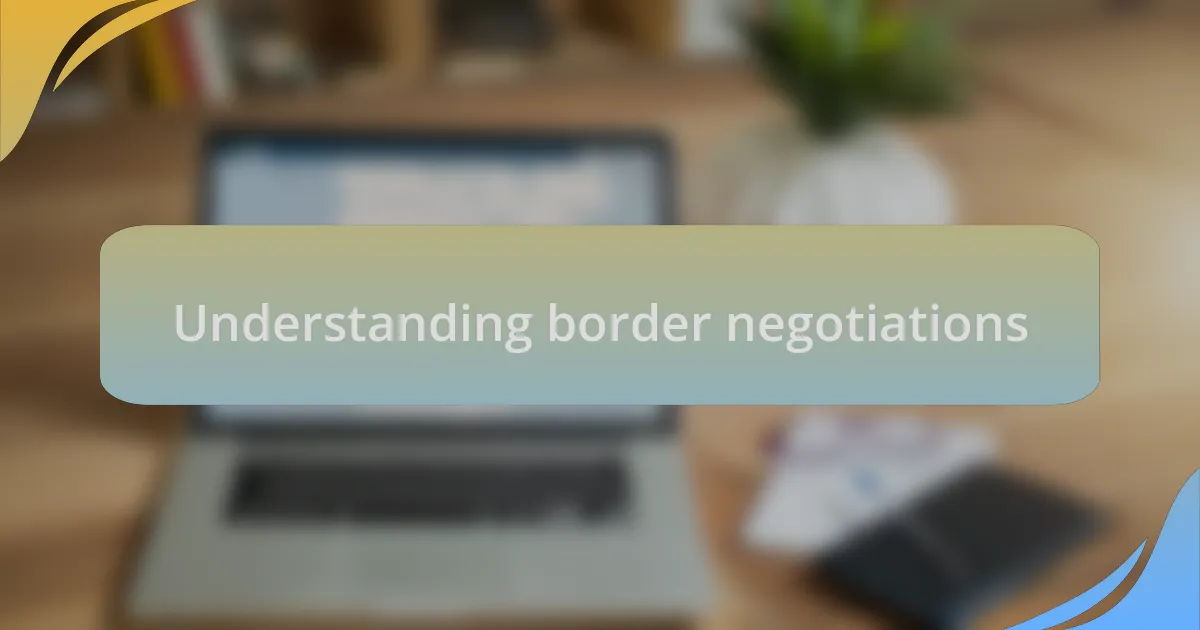
Understanding border negotiations
Border negotiations are often intricate and multifaceted, requiring an understanding of the underlying political, social, and economic factors. Reflecting on my experiences, I’ve noticed that successful negotiations go beyond just discussing terms; they require building relationships. Have you ever considered how trust can change the dynamics of negotiation? I’ve seen firsthand how a moment of genuine connection can lead to breakthroughs that rigid tactics could never achieve.
As I delve deeper into the negotiations, I realize that cultural empathy plays a crucial role in understanding each party’s perspective. Once, in a tense negotiation, acknowledging a cultural norm shifted the atmosphere from confrontational to collaborative. It’s fascinating how small gestures or words can redefine the interaction, isn’t it?
Moreover, what often surprises me is the importance of patience in these discussions. I’ve learned that taking the time to listen, even when it seems tedious, opens doors to new solutions. Have you ever experienced a moment where simply waiting allowed clarity to emerge? In my experience, those quiet moments can yield the most significant insights.
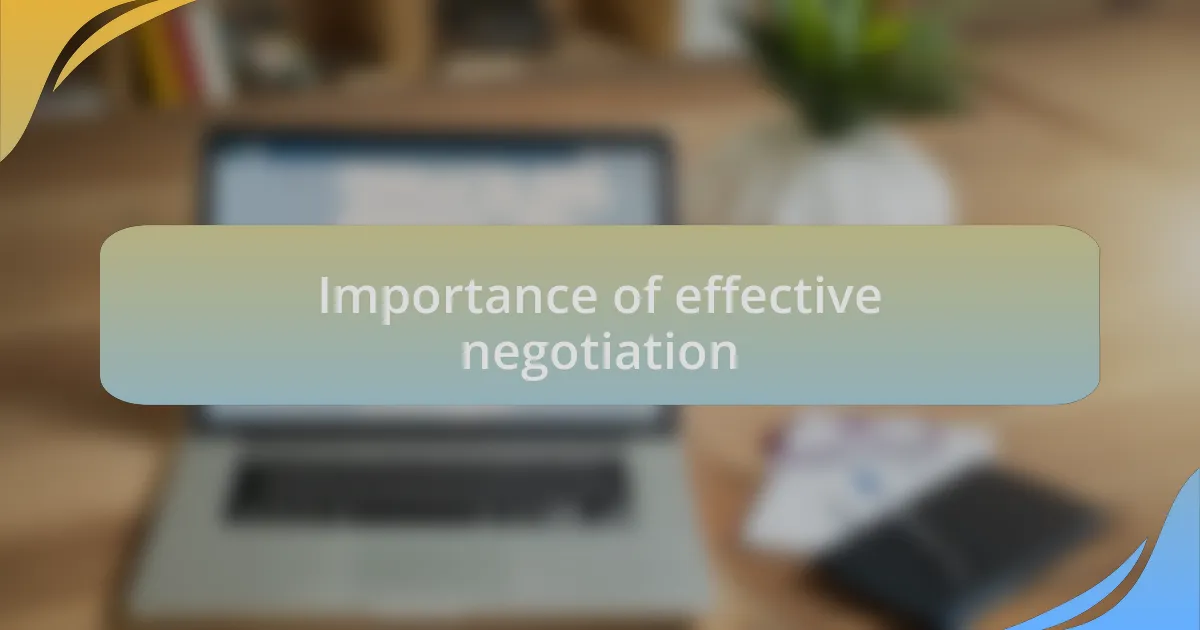
Importance of effective negotiation
Effective negotiation is a cornerstone of successful border discussions. I recall a pivotal moment when, during a heated exchange, I chose to pause and ask open-ended questions. This simple shift transformed a potential standoff into a productive dialogue. Isn’t it remarkable how asking the right question at the right time can unlock a different kind of conversation?
Another aspect I’ve come to value is the need for flexibility. In one particular negotiation, I faced unexpected counteroffers that initially frustrated me. However, embracing that uncertainty allowed me to adapt my strategy, and ultimately, we reached a consensus that was beneficial for both parties. How many times have we held rigidly to our first plan, only to miss out on better opportunities?
Ultimately, fostering an environment of mutual respect can greatly enhance negotiation outcomes. I once witnessed a colleague take the time to acknowledge the other party’s concerns, which led to a more respectful exchange. It reminded me that diplomacy thrives on consideration, turning adversaries into potential partners. Have you thought about the power of respect in bridging divides?
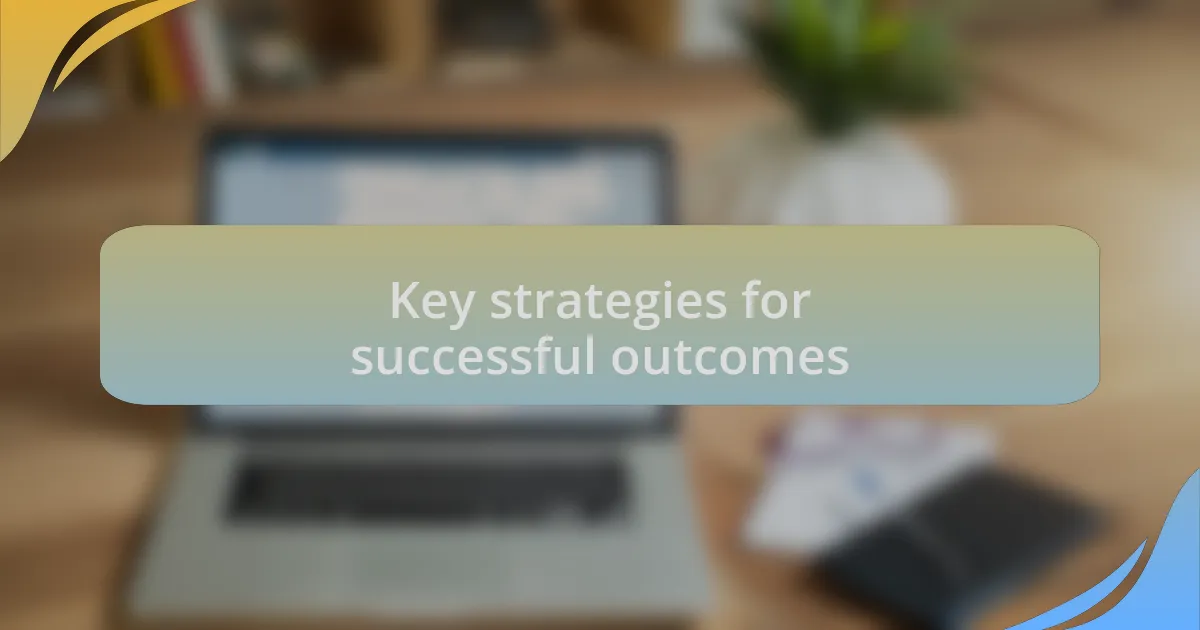
Key strategies for successful outcomes
When pursuing successful outcomes in border negotiations, establishing a rapport can make a world of difference. I remember a situation where I focused on building connections before diving into the issues at hand. This approach not only eased tensions but also opened doors to genuine understanding. Isn’t it interesting how a little kindness can transform relationships, even in high-stakes environments?
Another effective strategy I’ve relied upon is clarity in communication. During one negotiation, I realized that using concise and clear language helped diminish misunderstandings. I made it a point to summarise key points periodically, ensuring everyone was aligned. How often do you find that a common goal is obscured by vague language? By prioritizing clarity, we pave the way for smoother discussions.
Lastly, patience is a crucial component that often gets overlooked. I recall feeling impatient during a lengthy negotiation, but stepping back to breathe and reassess helped me maintain perspective. In those moments, I learned the value of allowing time for reflection. Have you considered how patience can sometimes be the key to unlocking breakthroughs?
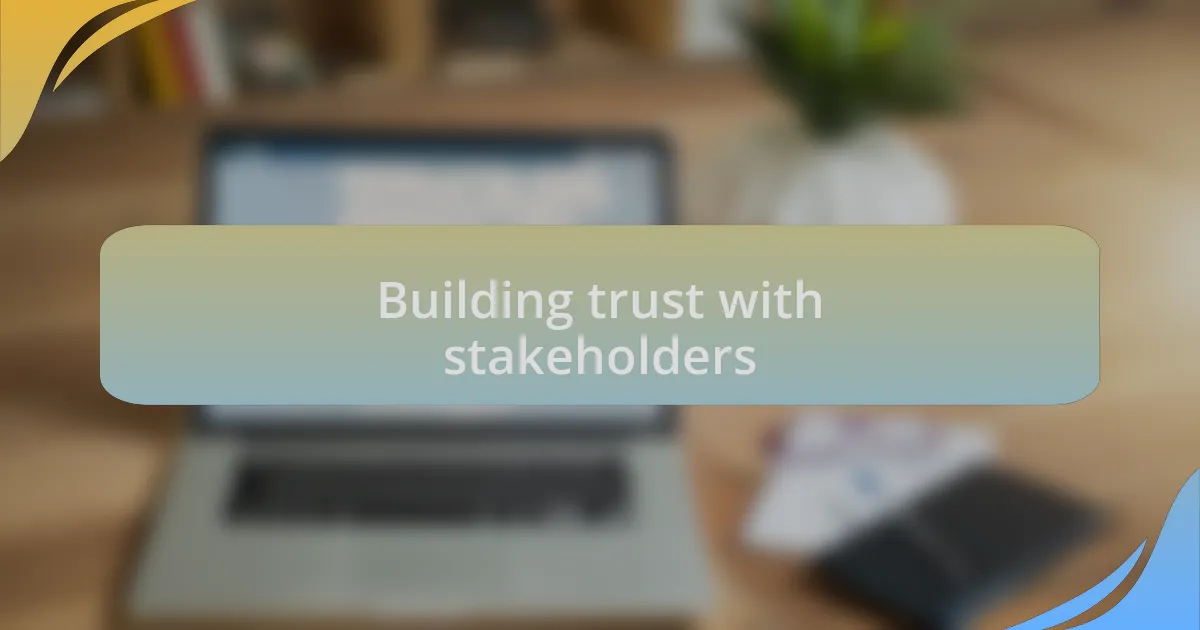
Building trust with stakeholders
Building trust with stakeholders is paramount in any negotiation setting. I once worked with a diverse group of stakeholders where I understood the significance of active listening. By genuinely considering their concerns and viewpoints, I not only built rapport but also fostered a safe space for open discussion. Have you ever noticed how much trust grows when people feel heard and valued?
Engaging in consistent follow-ups is another strategy I’ve found effective in nurturing trust. In one particular project, I made it a point to check in with stakeholders after our meetings, acknowledging their input and addressing any lingering questions. This approach kept our relationship strong and reaffirmed my commitment to the shared goals. How reassuring is it to know that someone is looking out for your interests long after the initial conversation?
Ultimately, authenticity plays a critical role in establishing trust. I remember a negotiation where I shared a personal story that connected to the issues we were discussing. It humanized the dialogue and made me relatable, encouraging others to share their stories too. Isn’t it fascinating how vulnerability can lead to deeper connections? By being genuine, we lay the groundwork for lasting partnerships based on trust and mutual respect.
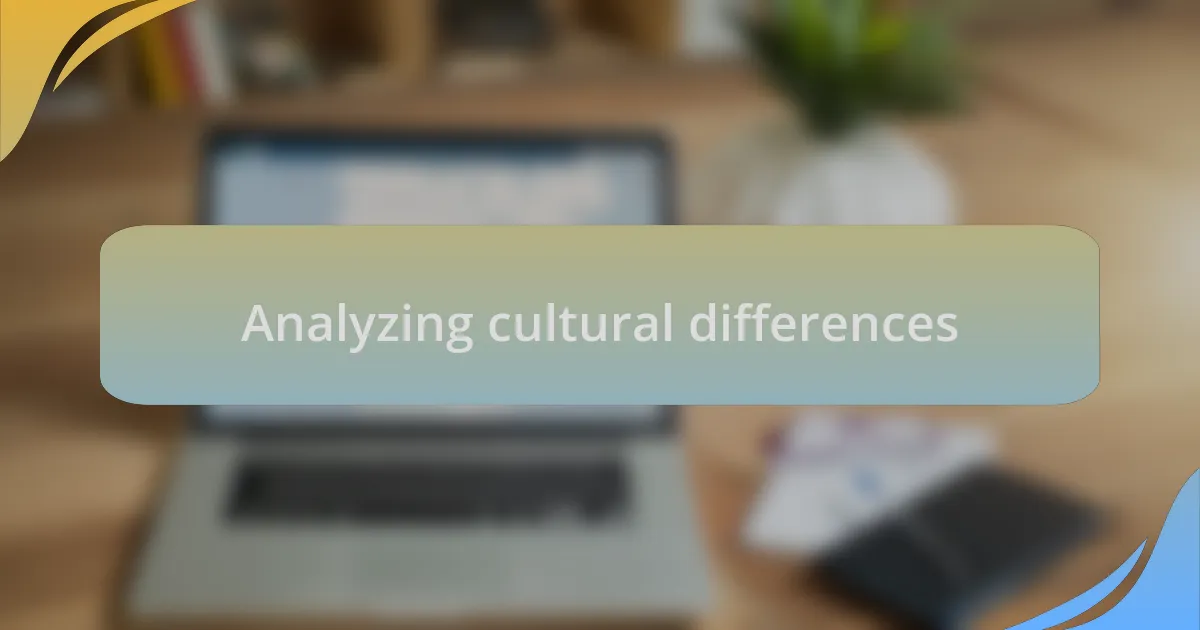
Analyzing cultural differences
When negotiating across cultural lines, I find that understanding the nuances of different cultures can provide invaluable insights. For instance, during a border negotiation with a group from a collectivist culture, I witnessed firsthand how decisions were often made as a group rather than by individuals. It made me realize that approaching negotiations with this awareness allowed me to tailor my communication style, which ultimately led to smoother interactions and better outcomes. Have you ever felt the impact of a cultural misstep in a conversation?
In another scenario, I learned the hard way that gestures can have vastly different meanings across cultures. I once unintentionally used a hand signal that was considered offensive in another country, causing immediate tension at the table. Recognizing these vital differences not only requires research but also a willingness to adapt. It’s almost like learning a new language—one that speaks to respect and understanding instead of just words.
Listening actively to cultural references can be just as enlightening. I recall a negotiation where a storytelling approach resonated well with my counterparts. Instead of jumping straight into facts and figures, I shared a story about the community’s struggles, which helped build empathy and foster a connection. Isn’t it remarkable how a well-told story can bridge divides and create common ground? By analyzing cultural differences, we not only enhance our negotiation strategies but also craft meaningful relationships that pave the way for successful partnerships.
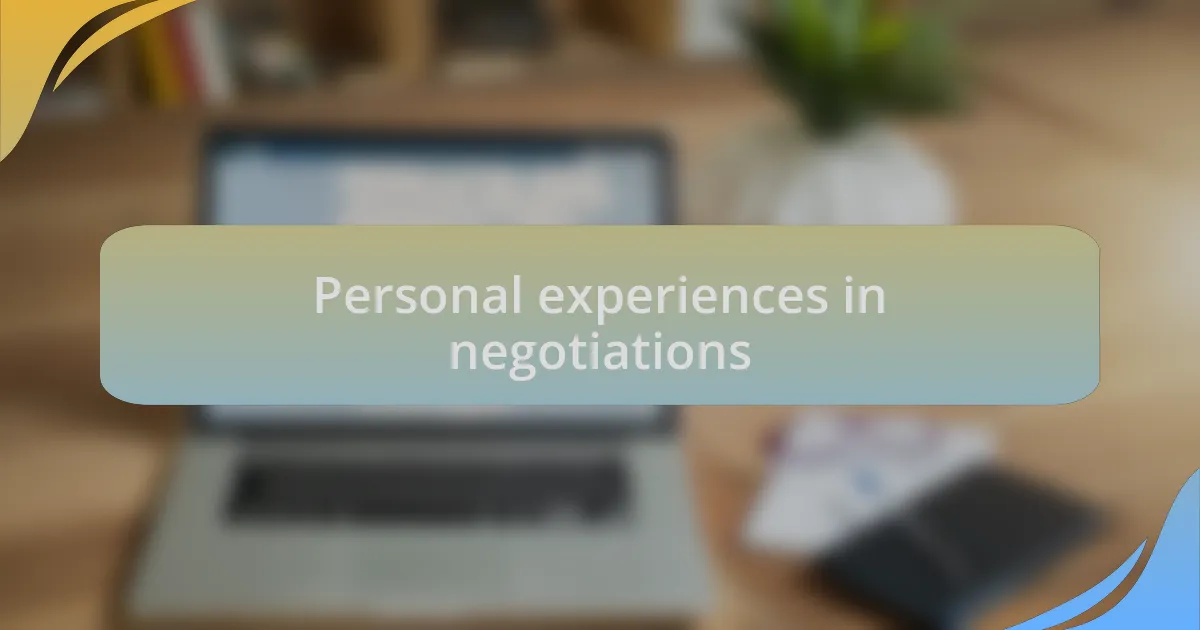
Personal experiences in negotiations
During my early days in negotiations, I found myself in a tense situation where emotions ran high. I remember sitting across the table, feeling the weight of expectations. It was then I realized that showing genuine empathy could transform the atmosphere entirely. By openly acknowledging the other party’s frustrations, we took a collective breath and shifted the focus toward finding mutually beneficial solutions. Have you ever noticed how just a few sincere words can change everything?
In another instance, I was part of a border negotiation that required me to navigate both the legal and human aspects of the discussion. I will never forget how a simple conversation about families impacted our dialogue. Both parties shared stories of loved ones living in different regions, which transformed our negotiation from a cold exchange of demands into a heartfelt dialogue filled with aspirations. This experience reaffirmed my belief that personal stories forge connections that dry facts often can’t.
Moreover, I’ve learned that patience is a vital ingredient when it comes to negotiations. There was a time when I rushed to finalize an agreement, thinking that speed was a sign of efficiency. Instead, that urgency led to misunderstandings that could have been easily avoided. Taking a step back allowed all voices at the table to be heard, which ultimately nurtured a foundation of trust. Don’t you agree that sometimes slowing down can lead to far superior outcomes?
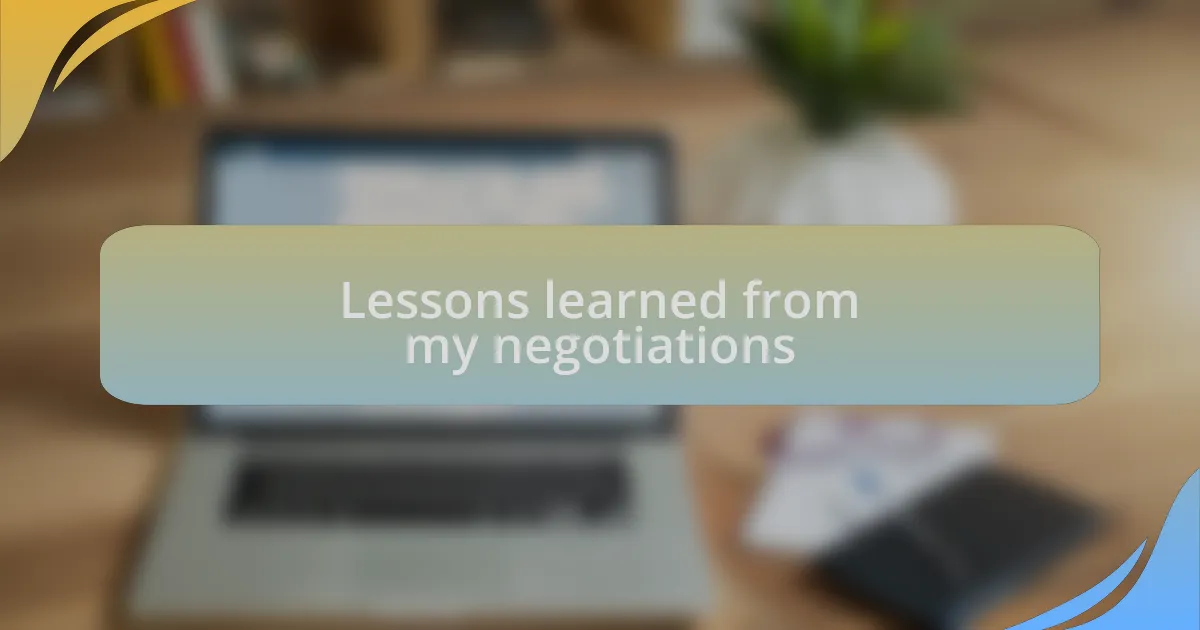
Lessons learned from my negotiations
In my journey through border negotiations, one significant lesson I absorbed is the power of preparation. I remember a particularly intense session where I arrived armed with data and facts, ready to counter any argument. However, I quickly learned that while facts are important, understanding the cultural and emotional landscapes of the other party was just as vital. When I shifted my focus to truly understanding their perspective, the negotiation shifted from a battle to a collaborative exploration of options. Have you ever entered a conversation thinking it was one-dimensional, only to realize it was richer than you imagined?
Another critical insight I gained relates to the importance of non-verbal communication. I recall a moment during a negotiation where silence hung heavy in the air, creating an uneasy tension. Instead of rushing to fill that silence with words, I chose to embrace it, allowing the other party the space to process their thoughts. This led to unexpected breakthroughs, as they opened up in ways I hadn’t anticipated. Do you think sometimes we underestimate the value of just sitting with the discomfort of silence?
Finally, I’ve come to appreciate the necessity of establishing common ground early on. During a negotiation that felt like a tug-of-war, I initiated a brief discussion about our shared goals and aspirations. This small shift in approach turned the atmosphere from adversarial to cooperative. It reassured everyone involved that we were not enemies but partners in seeking solutions. Isn’t it fascinating how a collective vision can pave the way for breakthroughs when tension seems insurmountable?